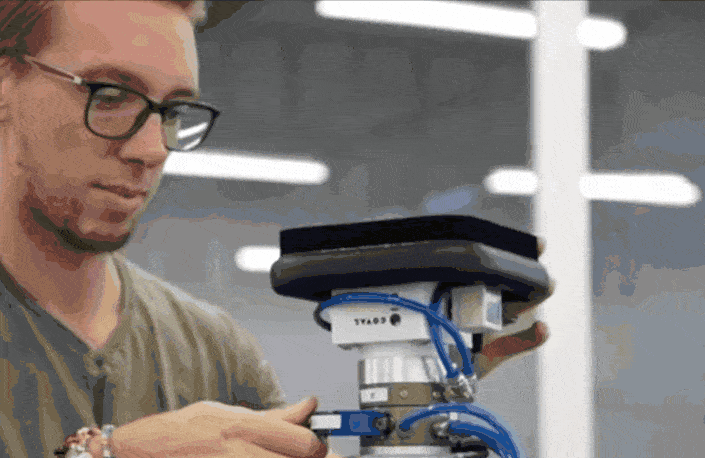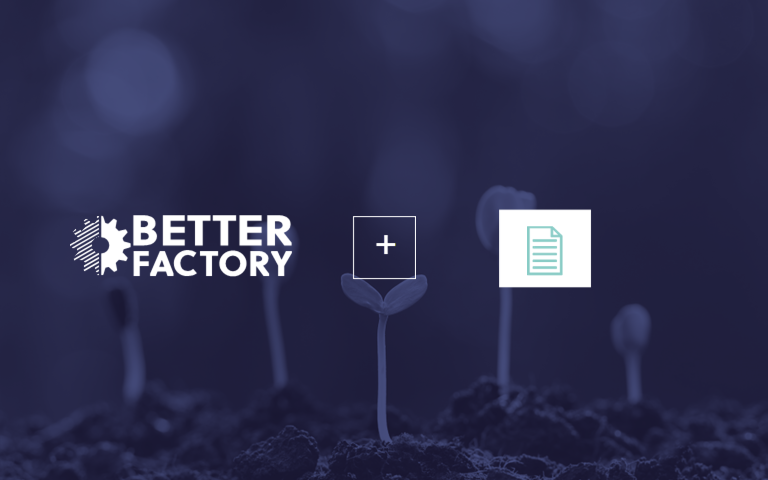Over the next couple of weeks we’ll be running a series of 1:1 interviews with the KTE (Knowledge Transfer Experiment) teams that joined Better Factory through our first open call. These incredible teams are each made up of a SME, artist and technology provider, working together to develop new and personalized products, become cyber-physical systems, and transforming into Lean-agile production facilities.
FOLD are expanding the production and usage possibilities of a new and promising sustainable material: stone paper. The KTE aims to work on a modular robot, leading the way in using stone paper to replace current plastics and paper in packaging solutions.
Their KTE team includes:
- Europack Bulgaria M EOOD – Manufacturing company (Bulgaria)
- Isaac Monte B.V. – Artist (Netherlands)
- Oviso Robotics SRL – Technology Supplier (Romania)
So let’s jump into the interview!
Hello, thank you for joining us! To start off, could you tell us why you decided to apply to Better Factory?
Europack Bulgaria M EOOD (Manufacturing company): We decided to apply because it’s an opportunity to work with international teams, and optimize one of the new processes in our factory.
Are you currently participating in any other international projects?
Europack Bulgaria M EOOD (Manufacturing company): No, but I applied for Life Project, which is a very big project. It’s for building a small factory. I have also participated in a number of Bulgarian projects.
Isaac Monte B.V. (Artist): For me, it’s quite similar. As an artist, I also participate in several projects. These are collaboration projects with team members from different backgrounds, usually in the realm of science and technology. I find it very interesting that artists are asked to come with creative solutions for problems that usually are difficult to solve, or artists have a different point of view to find solutions for these kind of problems. I like to come up with those solutions, have these collaborations and challenge each other.
Oviso Robotics SRL (Technology supplier): Okay, so I have participated in other projects, but in other companies. I have participated in regional growth programmes for different regions in Romania and different projects in collaboration with the Technical University here, mainly on robotic solutions. It was a good opportunity to have this new challenge with different partners from other countries, to put them together and have actual new challenges in our factory and organization.

How do you think Better Factory will help you in your daily life, in the manufacturing processes, or in your business?
Isaac Monte B.V. (Artist): Well, for me personally I think it’s showcased to other companies how an artist can have a valuable part in these kinds of collaborations. I think that’s also what RAMPis intended for, or it’s one of the reasons why RAMP is there. It’s to connect different types of companies with artists, with tech suppliers. And I think that this project is showcasing that as an example, and hopefully other companies will contact me and other artists as well.
Oviso Robotics SRL (Technology supplier): Also for us, it was a good opportunity to see the initiative and the new technologies that are open now for manufacturers and other partners from the tech supplier side. It’s more a show of what we can do actually now with the new technologies and implement them in the new manufacturing plans and so on.
Europack Bulgaria M EOOD (Manufacturing company): For me, there are different motivational factors, but the most important is that for this new product, there isn’t any machine that I can buy off the shelves, and it’s very expensive to invest in making such a machine without knowing the outcome. With this funding, which is covering the development risks, even if it doesn’t work at the end, I didn’t invest money in this machinery. What makes this funding very attractive for all kinds of manufacturing companies, is to start something for automation without taking on all the cost yourself. The banks don’t give money for intellectual knowledge. But thanks to Europe and this funding, we can move forward.
In how many years do you think it will be possible to replace polluting alternatives with stone paper?
Europack Bulgaria M EOOD (Manufacturing company): Well, my idea was to do it last year, but because of the high price of transportation, ten times higher than before, I postponed the project. And now today, in a couple of hours, I have board of directors meeting where I will propose to start buying anyhow and start replacing them, because the Directive of Europe will make the use of composite papers almost impossible. So I have to jump. Nevertheless, it’s a big risk and it costs a lot of money, but I plan to start doing it from this year on.
Do your countries have different levels of environmental awareness if so, do you think that this will have an impact on the development of the project?
Europack Bulgaria M EOOD (Manufacturing company): I think European Directives are for all countries, however how each country implements this is a different story. Specifically for Bulgaria, there are challenges in implementing these directives, but somehow in certain industries and directions, this environmental awareness is coming through very quickly. I think tourism is one to watch in Bulgaria, because the ‘customers’ are European citizens and they will not bypass these directives, which in turn motivates the Directive fulfillment. It depends on the subject area, however in Bulgaria one area with many challenges is the lack of collection and separation of different types of trash.
Oviso Robotics SRL (Technology supplier): Yes, it’s the same over here. There were some initiatives, but it’s very hard to change the mentality of people, about the environment and nature itself. They said that they will give out fines to people if they do not do this…
It’s a small drop in the ocean and it’s very hard to change a whole mentality with small actions.
Isaac Monte B.V. (Artist): Yes, so I’m originally from Belgium but I’m based in the Netherlands, and I think that the Netherlands is one of the front runners in this context. For us it’s very common to separate plastic, paper, green waste; people are aware of this and they just do it. On the other hand, the government also makes it less attractive to throw things in with the regular waste because you have to pay per pickup, or you have to pay per bag. Additionally, the bags for separating plastic, for example, are blue and cheaper than the bags for the rest of the waste which are yellow. So by separating you make it cheaper for yourself.
I think as a team we’re all on the same page because the core of our collaboration project is stone paper, which is a sustainable alternative for cellulose based paper. And besides that, one of our challenges that we also want to tackle is to reduce waste in the production process by making less errors, by being more economical in cutting the paper to the desired dimensions. So yeah, I think as a team we all want to go for the same goal.
In the proposal you talk about the impacts of the project. Could you go into some more detail and tell us more about the most important economical, technical and societal impacts?
Europack Bulgaria M EOOD (Manufacturing company): Economically, I expect the project to give me the capability to tackle the big market of grow tubes, which is estimated at comprising 3 million new wine trees planted just in Bulgaria per year. At the moment, if the market jumps, it’s impossible to fulfill the requirement. So for me the project is crucial in terms of meeting the market needs. If we also create additional products, this will expand the innovative direction of our production, which in turn will allow me to enter new markets and gain new customers. So for me the economic impact is huge.
What about the societal impacts?
Isaac Monte B.V. (Artist): So I believe that not many people are already aware of the fact that stone paper exists. If you look at individuals, we know that we have to make a change and that all kinds of small actions can make a big difference. So by implementing stone paper as an ecological alternative for existing products, but also coming up with new products, I think this can create a big impact on society and on individuals as well.
Europack Bulgaria M EOOD (Manufacturing company): It’s a game changer. The stone paper in itself, as it’s not made with HDP, but with some of the biodegradable polymers. In the future it will really be a big jump in the right direction.
And the technological impacts?
Oviso Robotics SRL (Technology supplier): I think the main technological impact, actually, is that the project is leading a new way in terms of how to use technology produce biodegradable materials and how to handle them. Because as we know, in the packaging and so on, they are still using products that are not ecological for the environment and so o. This is a big step forward for us in this direction and also in the project, and for SMEs. I think the implementation of new technologies will be a very good idea and a big step in fulfilling the requirements of the market.
For many people their first thought when you suggest collaborating with robots at work, is that they will loose their job. So my question is: what are the expectations of your workers and how willing are they to collaborate with this automation technology?
Europack Bulgaria M EOOD (Manufacturing company): Well, you’re absolutely right. The funny thing is that since I presented the project to my workers and explained to them what we are going to do, then they came to me and said: ”We think this cobot is very slow, and we can do it better.” So it’s obvious resistance, but this has already happened to us before; previouslyan engineer made a packing table for our workers, which is really genius. One hydraulic arm to pack the boxes. They still don’t use it. It’s total refusal. And knowing this, I hired an engineer on our project. And nevertheless, in the beginning they were against him. Now seeing that many of the problems are being solved, they are starting to believe that this is the way to go. If I were a writer, I would write a book about the two worlds coming together. It’s amazing, the path from rejection, to curiosity.
I think we could act as a model, as beyond the project we already see that we can collaborate on other things as well.
Isaac Monte B.V. (Artist)
And how are you going about making this option more attractive, in addition to hiring the engineer?
Europack Bulgaria M EOOD (Manufacturing company): I talked about hiring Nikki, the engineer, at a very early stage, and showing that this technology and his knowledge can be of help. I think this is already opening their eyes and is helping. They realize that he will be the one who will really organize things, handle the first steps of the cobot, which will help them. SoI think it was a really critical moment to bring in a new person to the team.
In order to tap into large markets such as France, Spain and Italy, your idea in the proposal was to partner with local producers and distributors in order to place the required technologies in their facilities and to produce there. My question is, how do you plan to manage these partnerships? Do you think they will be willing to give you part of their space to install this equipment?
Europack Bulgaria M EOOD (Manufacturing company): In fact, this idea came from somebody who is selling wine in Bulgaria, an Italian guy, who showed us that outside the season, there are a lot of workers not in the field, but working internally to prepare the vines to be sold and planted by their customers. In fact, the idea came out of this in that in parallel they can also make grow tubes and sell them together with the wine trees. Then it’s not a competition, but it’s more that the cobot will deliver them the technology, and the stone paper they can buy it from us or buy it from the distributor in Italy. In this way the technology will be sold, not the final product. Of course, if they want to have in addition, more products, etcetera, they can buy from us. The idea is to cooperate at a technology level, not at product level.
Do you think that your collaboration in this project is a model for creation and research in the field?
Europack Bulgaria M EOOD (Manufacturing company): Yes, but again, let me repeat some original thoughts from the beginning. Every time a company goes into a new process, it’s always a big risk. Countries that give companies grants when they need to develop a new product, new process, etc., are the most successful in supporting their businesses to invent new products, decrease the waste, and so on.
Oviso Robotics SRL (Technology supplier): Here in Romania there is really nice collaboration, let’s say, or initiative between universities, IT companies and different manufacturing companies. Well, mainly here in Cruise, I don’t know about the rest of the country. What these clusters try to do is, as we have here, with different people from different scenarios, consider how can we put them together in order to come up with something that can benefit everyone? It’s working, but there are also challenges. I believe that each and every one of us is really good at something, and if we want to produce something really good, we should not try to succeed at everything ourselves, but collaborate to pull on our strengths, and save time. You don’t have to do so much research online, losing time because you don’t know what to search for and so on. So this is a really good collaboration from my point of view.
Isaac Monte B.V. (Artist): I think a lot has already been said. The only thing I wanted to say is that, again, I think it’s more common in the Netherlands to have these kinds of collaboration projects. For this reason I think we could act as a model, as beyond the project we already see that we can collaborate on other things as well. I think that’s a proof or a nice example of when these collaborations are settled that other opportunities arise. So I think that’s very interesting to see.
If you’d like to learn more about FOLD and their experiment, don’t forget you can check out their KTE page here, including a cool video!

